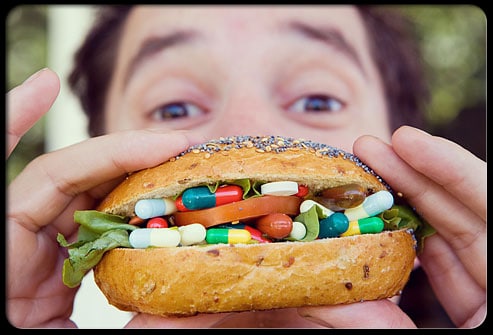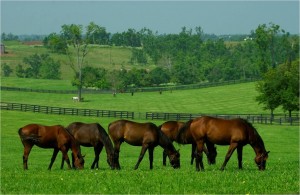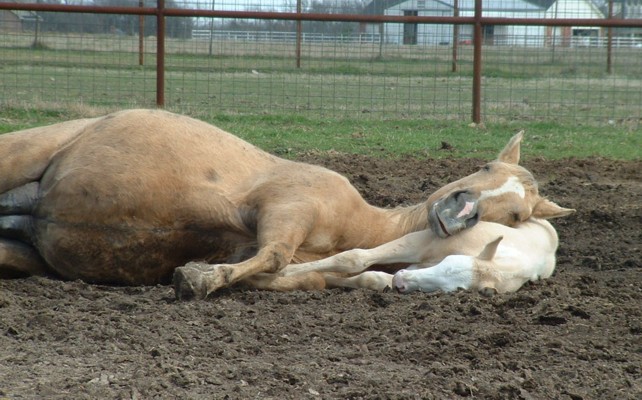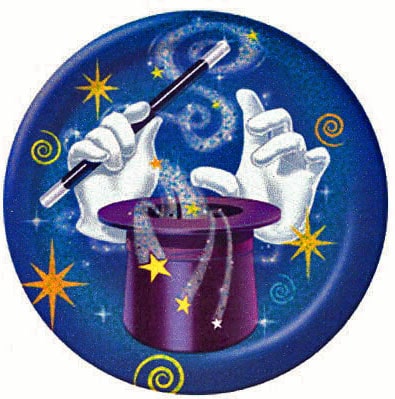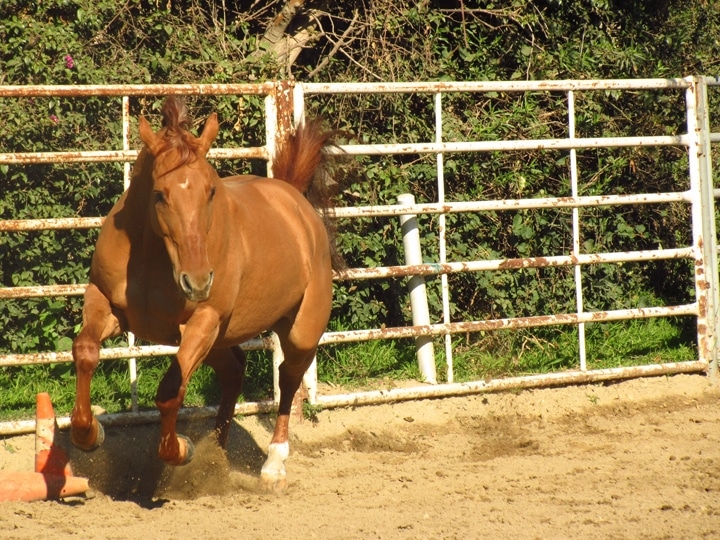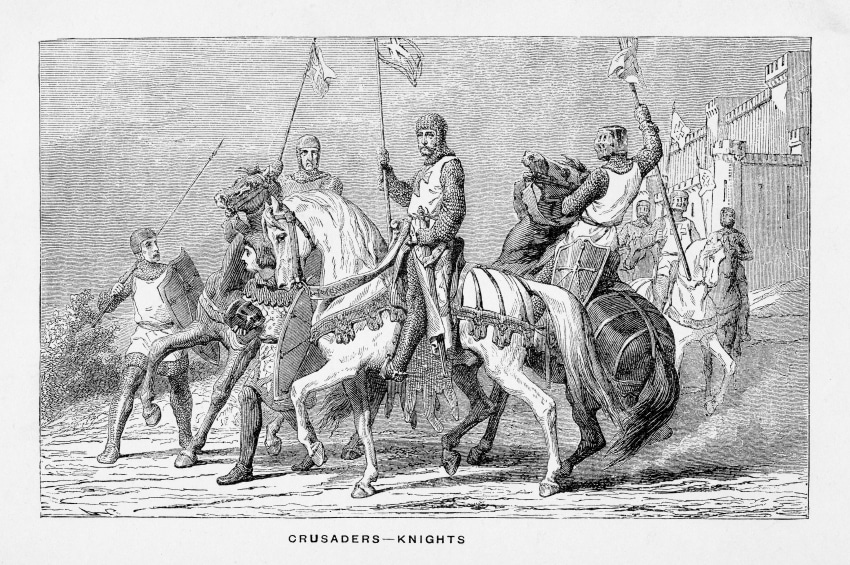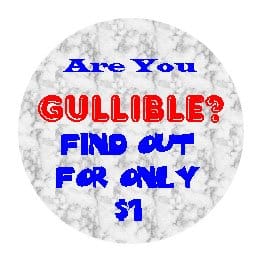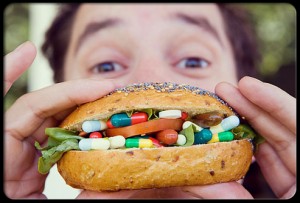 There’s a pretty interesting article in the March 2013 edition of the Journal of the American Medical Association, Internal Medicine.
There’s a pretty interesting article in the March 2013 edition of the Journal of the American Medical Association, Internal Medicine.
AHEM: In case you’re wondering, I do have other things to do with my life besides reading medical journals. I get contents alerts by email.
Anyway, the article is called, “Why US Adults Use Dietary Supplements.” And you can read the entire article, if you are so inclined, if you just CLICK HERE. They surveyed over 20,000 households – which is a lot, and especially for a scientific study. There are some pretty interesting findings, which, in case you don’t want to read the article, are as follows.
1. Fewer people are using dietary supplements. Not a lot fewer, but some fewer.
2. People mostly take dietary supplements because they think that by doing so, they can improve their health. Mind you, in most of these people, there’s nothing wrong with their health, it’s just that they are apparently thinking that by taking supplements, they’re covering all their health bases.
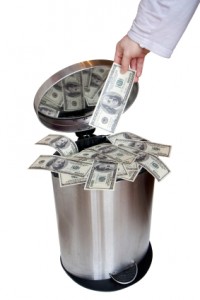 3. The most common supplements taken are multi-vitamins.
3. The most common supplements taken are multi-vitamins.
4. The people who take supplements tend to be less heavy, have moderate alcohol use, exercise more, don’t smoke, and have health insurance. In other words, the people who probably need supplements the least are the ones who take them the most.
5. There’s a good bit of research out there in humans that shows that most supplements are, at best, harmless, and, at worst, harmful.
So, as I’m reading this article, it occurs to me that these reasons are an awful lot like the motivations that people have when giving supplements to their horses. They figure that, hey, they can’t hurt, and, who knows, they might help. While horses are, in general, very healthy creatures (CLICK HERE to read my article on that), a person can always feel good about giving supplements because, heck, the horse is healthy. But the fact remains that most horses don’t need supplements, and if you give your horse vitamin supplements, you’re really not doing much of anything at all (except throwing money away).
Even so, I figure that you’re not the sort of person who is going to just take my word for it. In all honesty, I wouldn’t want you to do that.
ASIDE: The question, “Why Do You Say That?” is one of my favorite questions, even though asking that question annoys a lot of people. For example, it was the sort of thing that got Socrates killed).
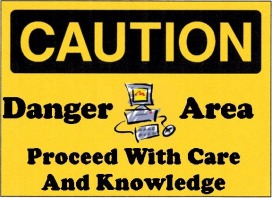 Anyway, there are two main reasons why I say that:
Anyway, there are two main reasons why I say that:
1. The color GREEN. The color that’s found in good quality hay, and pasture.
2. The bacteria that live in your horse’s intestines.
So, knowing that, here’s a list of commonly supplemented vitamins, and the reason(s) that your horse probably doesn’t need them.
VITAMIN A – Great vitamin. Vitamin A has many important roles and functions for the horse’s body, including being involved vision, aiding the disease-fighting immune system, and helping with reproduction and growth. Wonderful stuff. Without vitamin A, your horse would be in terrible shape.
HOWEVER, if your horse has eating anything that has the color green in it in the last three to six months, your horse doesn’t have a vitamin A deficiency, and isn’t going to get one. Vitamin A is stored in the liver, and your horse can go for a fairly long time without running into vitamin A problems, even if he’s never fed anything with vitamin A (or its precursor, beta-carotene) in it.
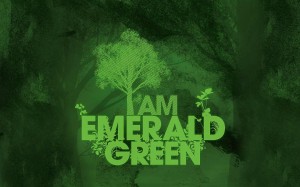 B-VITAMINS – There are a bunch of B-vitamins, and they have great, imposing names, like riboflavin, niacin, thiamine, and pyridoxine, which is probably why most people just number them (B-1, B-2, and such). They are very important in lots of body functions, like blood cell production, energy production, and all sorts of other fun things related to cell metabolism. Your horse certainly can’t do without B-vitamins.
B-VITAMINS – There are a bunch of B-vitamins, and they have great, imposing names, like riboflavin, niacin, thiamine, and pyridoxine, which is probably why most people just number them (B-1, B-2, and such). They are very important in lots of body functions, like blood cell production, energy production, and all sorts of other fun things related to cell metabolism. Your horse certainly can’t do without B-vitamins.
HOWEVER, your horse’s digestive system is quite different from yours. If you don’t eat B-vitamins, your body is going to be in trouble. In fact, the guys that figured out how important B-vitamins were got a Nobel Prize in 1934. (CLICK HERE if your curiosity is overwhelming you, and you want to read all about the Nobel Prize and the Discovery of Vitamins.) But your horse doesn’t need them, because the bacteria that live in the horse’s intestines produce B-vitamins, and the horse happily absorbs them. It’s pretty much impossible to feed a horse a good diet and end up with a B-vitamin deficiency. In fact, feeding a ration that had essentially no vitamin B12 in it eleven months didn’t affect the studies horses’ blood counts or health.
ANOTHER BIT OF B-VITAMIN SILLINESS: Lots of people give horses vitamin B-12 to “help boost their energy.” However, Vitamin B12 injected into racehorses and foals is rapidly and nearly completely removed from the circulation by the liver, passed into the intestines, and pooped out (if you’re really interested, the work was done in 1982, in Australia. CLICK HERE to see the results.)
VITAMIN C – Vitamin C is important for all sorts of things: the immune system, making tissue proteins, and many more. It’s in oranges (which most horses don’t eat, even though I’ve run across a few that do). Vitamin C jumped to prominence when the Nobel Prize-winning physicist Linus Pauling asserted that taking lots of vitamin C can help prevent the common cold.
NOTE: Even though it’s been conclusively shown that taking extra vitamin C does absolutely nothing to help prevent or treat the common cold, people still take it for those purposes all the time. That says a lot about human nature, and nothing about vitamin C.
Horses make all the vitamin C that they need on their own (without gut bacteria). There’s really no reason to give it to healthy horses. Plus, if horses are given long-term overdoses, they may reduce their own production, which can theoretically resulting in deficiencies once the overdose is stopped. That apparently hasn’t happened either, but I’m just saying, giving lots of vitamins to your horse isn’t necessarily harmless.
VITAMIN D – Without vitamin D, bones would be brittle and thin. Among it’s many functions, Vitamin D promotes the absorption of calcium in the gut, and it’s needed for normal bone growth. I shudder to think where horses would be without vitamin D.
HOWEVER, horses that get more than four hours of sunlight per day, or eat hay that has been cured in the sun (like, well, hay), do not have dietary requirements for vitamin D. You couldn’t make horses deficient in vitamin D unless you wanted to. If you keep your horse in the dark all of the time, and don’t feed him fresh forage (like good hay or pasture), your horse could be in trouble, however. Simple solution: don’t do that.
VITAMIN E – Horses need vitamin E, no doubt. It’s got very important functions for the immune system, and it runs around picking up compounds called free radicals, which are important in the process of inflammation.
HOWEVER, in most parts of the world, horses get plenty of vitamin E. It’s the green thing again. If the feed is green (pasture, fresh green hay), your horse is going to get plenty of vitamin E, and you don’t need to give it any more. And, there’s more good news – Vitamin E is stored in the horse’s body for several months.
Vitamin E deficiencies are reported. Rarely. Feed green.
VITAMIN K – Vitamin K is very important for blood clotting. Without vitamin K, if your horse cut himself, there would be a big puddle of blood on the ground.
HOWEVER, those industrious bugs that live in your horse’s guts make vitamin K, too. They make all that the horse needs, and, as long as you feed your horse anything other than moldy sweet clover, you’ll never even have to think about it.
Now some of you readers aren’t lucky enough to be able to give your horse green stuff all of the time. In the cold winters that afflict many parts of the world, horses have to eat hay that, to be honest, is less than ideal. OK, I’ll say it: it can be pretty bad, all brown, and dry: icky. If you feed your horse poor quality hay, it’s likely to be lacking in vitamin A and E. But more importantly, poor hay is lacking in calories.
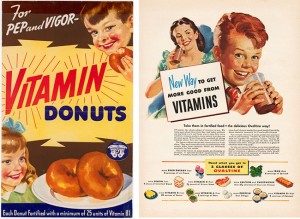 In places where the hay is poor in the wintertime, people tend to feed their horse some grain to make up for the lack of calories in good green hay or green pasture. Mostly, the feed any one of any number of fortified grain products.
In places where the hay is poor in the wintertime, people tend to feed their horse some grain to make up for the lack of calories in good green hay or green pasture. Mostly, the feed any one of any number of fortified grain products.
“Fortified with what?” you ask.
Why…. vitamins!
So, you see, even if your horse is getting a diet consisting mostly of crummy hay, if you’re feeding him some extra grain so he doesn’t lose weight, he’s still probably getting enough vitamins.
Finally – this is a sort of final nail in the coffin thing – if you are giving your horse a vitamin supplement, it’s probably not made with any particular attention to what the horse actually needs. I did a research project on the content of five prominent supplement products in 2011, and it turns out that they don’t contain any sort of nutritional balance 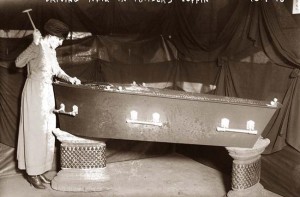 anyway (CLICK HERE to read about that – honestly, it’s a pretty great article, and there’s a slide show you can click through, too). The bottom line is that if your horse is eating green stuff, he doesn’t need a vitamin supplement. And, if he’s not eating green stuff, you’re probably already giving him extra vitamins anyway. And, even if he’s not eating green stuff, he has to not be eating it for several months before you’ll even possibly begin to see a problem.
anyway (CLICK HERE to read about that – honestly, it’s a pretty great article, and there’s a slide show you can click through, too). The bottom line is that if your horse is eating green stuff, he doesn’t need a vitamin supplement. And, if he’s not eating green stuff, you’re probably already giving him extra vitamins anyway. And, even if he’s not eating green stuff, he has to not be eating it for several months before you’ll even possibly begin to see a problem.
You’re horse is not only a great companion, he’s (and his bacteria) are trying hard to save you money, too. Forget the vitamins-in-a-bucket. Feed green.

